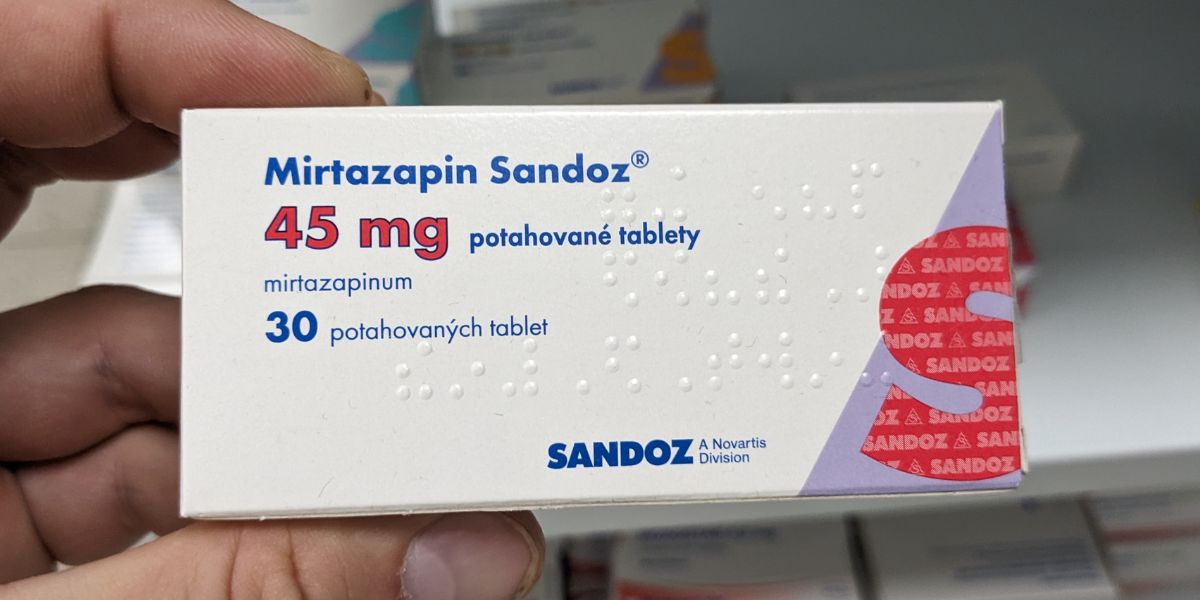Remeron Side Effects and Uses

Remeron, or mirtazapine, is a medication primarily prescribed to treat depression, specifically major depressive disorder (MDD). This antidepressant is part of the tetracyclic class of drugs. It helps balance chemicals in the brain, like norepinephrine and serotonin. For many, managing their mental health and improving overall well-being is crucial.
Remeron is good for treating depression, but it can also cause side effects. These side effects can range from mild to severe. You must be aware of these effects and consult with your doctor to ensure the medication is right for them.
What Is Remeron?
Remeron, known generically as mirtazapine, is a commonly prescribed antidepressant. Doctors primarily use it to treat major depressive disorder (MDD), and they classify it as a tetracyclic antidepressant. Mirtazapine works by balancing chemicals in the brain, particularly norepinephrine and serotonin, which are believed to play a significant role in mood regulation. Healthcare professionals often recommend this medication because of its effectiveness in treating depression and associated symptoms.
Mirtazapine is also known for its sedative effects, making it particularly useful in treating patients with depression who experience insomnia or anxiety. Its way of working is different from other antidepressants. This can help patients who have not responded to other medications.
Like all medications, mirtazapine can have side effects. Understanding these risks is essential for safe use.
Patients and healthcare providers must be aware of the possible side effects and risks of mirtazapine. Discussing your complete medical history with your doctor is important because it helps avoid complications. Also, seek medical help if you notice any unusual symptoms during treatment.
Patients considering Remeron must also know its potential interactions with other drugs and medical conditions. People with health issues, such as heart rhythm problems or liver disease, should consult a doctor. They should do this before starting mirtazapine.
Remeron Uses
Remeron’s primary use is to treat depression, particularly when patients show poor responses to other antidepressants. In addition to major depressive disorder, mirtazapine is sometimes prescribed for anxiety, insomnia, and post-traumatic stress disorder (PTSD). Because of its sedative properties, doctors often give it to those experiencing insomnia as a symptom of depression.
However, patients should always talk to their doctor before using it for off-label conditions. Its effects can change based on other health issues or medications.

What Are the Side Effects of Mirtazapine?
Mirtazapine can be effective, but it is important to know that it has common side effects. These include:
- Dry mouth
- Increased appetite and weight gain
- Drowsiness
- Dizziness
- Sore throat
- Vomiting, diarrhea
- Increased heart rate
Some patients may experience swollen lymph nodes or white blood cell problems, which could affect the immune system. Additionally, trouble breathing or other allergic reactions should prompt immediate medical attention. Always talk to your doctor about side effects. This will help you know if they are serious or a sign of a bigger problem.
Severe Side Effects of Mirtazapine
While the common side effects of mirtazapine are generally manageable, some people may experience severe reactions that require immediate intervention.
These severe side effects include:
- Blistering, peeling, loosening of skin
- Suicidal thoughts or worsening depression
- Liver disease signs such as yellowing skin
- Chest pain or other heart attack symptoms
- Angle-closure glaucoma causing sudden eye pain
Mirtazapine may cause heart rhythm problems in some patients. This is especially true for those with a history of heart issues. If you experience these symptoms, talk to your doctor or visit an emergency room. Understanding the potential for these side effects is crucial to making informed decisions about mirtazapine treatment.
Remeron Drug Interactions
Remeron can interact with other medications. This may raise the risk of side effects or lower the treatment’s effectiveness. Patients should be cautious of the following drug interactions:
- Methylene blue
- St. John’s Wort
- Certain heart medications
- Blood pressure medications
- Antidepressants
- Medications affecting sodium levels
- Bipolar disorder treatments
Always inform your healthcare provider about any supplements or medications you are taking to prevent dangerous interactions.
Mirtazapine Warnings
Before starting mirtazapine, specific warnings and precautions should be considered, particularly in vulnerable populations. These warnings include risks related to:
- Older adults
- Liver disease
- Angle-closure glaucoma
- History of heart problems
- Suicidal thoughts
- Bipolar disorder
- Low sodium levels
Patients with these conditions should be careful when starting Remeron. The medication may worsen existing problems or cause new symptoms.
Long-Term Effects of Remeron
Over time, people taking Remeron may face long-term effects that could impact their health. The most commonly reported long-term effects include weight gain, often significant, and persistent drowsiness. Additionally, chronic use may increase the risk of blood pressure issues or heart rhythm problems.
Older adults are especially at risk from these effects. Mirtazapine can increase their likelihood of falling and getting hurt due to drowsiness and dizziness.
Using mirtazapine for a long time can negatively affect some medical conditions. For example, it can increase the risk of manic episodes in people with bipolar disorder. St. John’s Wort and other herbal supplements may also cause dangerous drug interactions when combined with mirtazapine.
Doctors tell patients to pay attention to how their bodies react to the medication and to check in with their healthcare professionals often.
Is Mirtazapine Risky?
Like all antidepressant medications, mirtazapine comes with certain risks, particularly for those with underlying health conditions or those who take it in conjunction with other medications.
Some risks of taking mirtazapine include:
- Low sodium levels
- Heart rhythm problems
- Suicidal thoughts
- Drug interactions
Those who suddenly stop taking mirtazapine might experience withdrawal symptoms, such as nausea, vomiting, and worsening depression. Tapering off the medication under the guidance of a healthcare professional is crucial to avoid these complications. The US Food and Drug Administration (FDA) offers clear guidelines on using mirtazapine safely. Patients should check these guidelines if they have any concerns about their treatment.

Symptoms of an Allergic Reaction from Mirtazapine
Although rare, allergic reactions to mirtazapine can occur and can be serious. It’s essential to recognize the symptoms of an allergic reaction early, such as:
- Red skin lesions, often with a purple center
- Blistering, peeling skin
- Swollen lymph nodes
- Eye pain
- Sore throat
- Difficulty breathing
- Chest pain
Call your doctor for advice about side effects. If you have any of these symptoms, seek emergency care right away.
Managing Weight Gain with Mirtazapine
One of the most common long-term side effects of mirtazapine is weight gain, which can be challenging to manage. To reduce the risk, it’s important to follow these guidelines:
- Consult with a dietitian
- Monitor calorie intake
- Exercise regularly
- Stay hydrated
- Avoid high-calorie snacks
- Eat balanced meals
- Consider a low-carb diet
Weight management strategies should be discussed with your healthcare provider to ensure they fit within your overall treatment plan.
Evidence-Based Rehab at Northridge Addiction Treatment Center
If you or a loved one is facing challenges related to mirtazapine use, it’s important to seek professional help. Northridge Addiction Treatment Center (NATC) provides compassionate, evidence-based rehab addiction programs.
NATC’s comprehensive programs are designed to help people with substance dependency and co-occurring mental health disorders. This includes collaborating with each patient to create a customized treatment plan to help build a strong foundation for lasting recovery.
NATC provides effective treatments and therapies that focus on the root causes of your addiction to ensure healing and progress toward sobriety. This approach ensures a complete and lasting recovery.
At Northridge Addiction Treatment Center, we use various scientifically proven therapies to help our patients regain control of their lives. These include cognitive-behavioral therapy (CBT), individual therapy, dual diagnosis treatment, group counseling, and medication-assisted treatment.
We understand the complex nature of addiction, particularly when combined with mental health disorders like depression.
Contact NATC today to learn more about how we can assist you on your path to recovery.
Find Meaningful Recovery
Our caring and compassionate specialists are eager to help you comfortably navigate this journey to recovery. Our individualized treatment plan, programs, and therapies may be a perfect match for you or your loved one. Let us assist you in living the happy life you deserve. It starts with a phone call.




